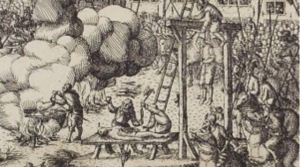Gallows Poetry, Anyone?

Have you ever heard the name Chidiock Tichborne?
My mother, who required us to memorize a poem every weekend, told me about him when I was very young. I was reminded of him earlier this week in an essay by Douglas Murray in The Free Press.
Tichborne lived in Elizabethan England. In 1586, he was accused of being a conspirator in the Babington plot, a scheme to dethrone Elizabeth and replace her with a catholic monarch, Mary Queen of Scots.
He was sentenced to die. But how he died, as my mother described it, was what locked his story in my brain for all these years. He was hung until he was nearly dead but still conscious, then pulled down from the gallows and racked in front of a viewing public, where he was castrated and disemboweled. The final touches: His head was chopped off and his body was hacked into pieces.
Before his execution, at the tender age of 24, he somehow had the courage to write this beautiful little poem, consisting entirely of one syllable words:
Elegy
By Chidiock Tichborne
My prime of youth is but a frost of cares,
My feast of joy is but a dish of pain,
My crop of corn is but a field of tares,
And all my good is but vain hope of gain.
The day is fled, and yet I saw no sun,
And now I live, and now my life is done.
The spring is past, and yet it hath not sprung,
The fruit is dead, and yet the leaves be green:
My youth is gone, and yet I am but young,
I saw the world, and yet I was not seen.
My thread is cut, and yet it is not spun,
And now I live, and now my life is done.
I sought my death, and found it in my womb,
I looked for life, and saw it was a shade:
I trod the earth, and knew it was my tomb,
And now I die, and now I am but made.
The glass is full, and now my glass is run,
And now I live, and now my life is done.
 MarkFord
MarkFord